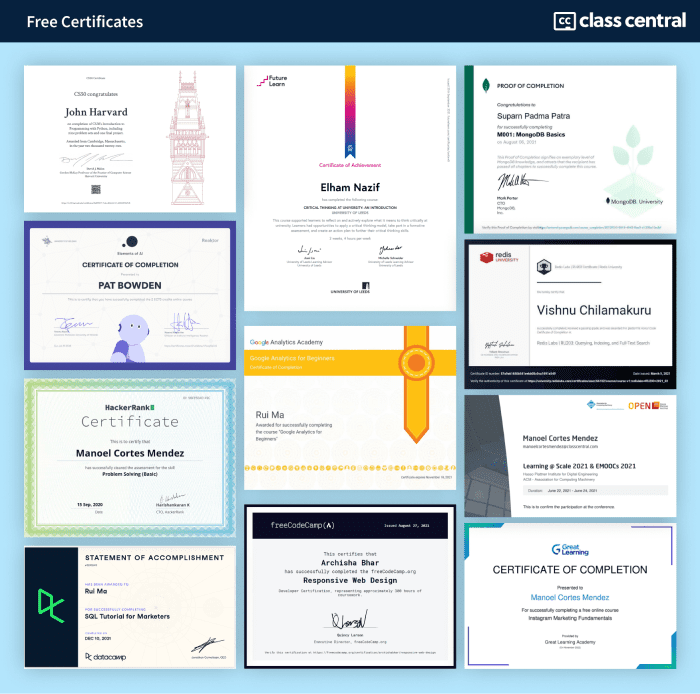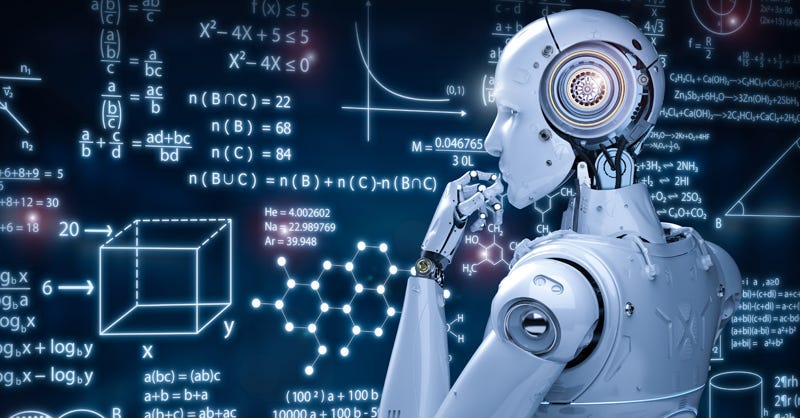All Categories
Featured
Table of Contents
- – Some Ideas on Why I Took A Machine Learning Co...
- – Machine Learning Crash Course For Beginners fo...
- – From Software Engineering To Machine Learning...
- – Advanced Machine Learning Course Fundamentals...
- – The Buzz on How To Become A Machine Learning...
- – The Only Guide for Leverage Machine Learning...
- – Getting My Machine Learning Engineer To Work
Some individuals assume that that's disloyalty. If someone else did it, I'm going to use what that person did. I'm requiring myself to believe with the feasible solutions.
Dig a bit deeper in the mathematics at the start, simply so I can build that structure. Santiago: Ultimately, lesson number 7. This is a quote. It claims "You have to recognize every information of a formula if you wish to use it." And afterwards I claim, "I believe this is bullshit recommendations." I do not believe that you have to recognize the nuts and screws of every algorithm prior to you use it.
I would certainly have to go and examine back to really obtain a far better instinct. That doesn't indicate that I can not solve things using neural networks? It goes back to our sorting instance I think that's simply bullshit suggestions.
As a designer, I've dealt with numerous, numerous systems and I've made use of numerous, lots of points that I do not recognize the nuts and screws of how it functions, even though I understand the impact that they have. That's the last lesson on that particular thread. Alexey: The amusing thing is when I think of all these collections like Scikit-Learn the formulas they utilize inside to implement, for instance, logistic regression or another thing, are not the very same as the algorithms we study in maker understanding classes.
Some Ideas on Why I Took A Machine Learning Course As A Software Engineer You Need To Know
Also if we attempted to learn to get all these fundamentals of maker knowing, at the end, the formulas that these libraries utilize are different. Santiago: Yeah, absolutely. I believe we need a lot a lot more materialism in the sector.

By the means, there are 2 different paths. I normally talk to those that intend to operate in the industry that intend to have their influence there. There is a path for scientists and that is totally different. I do not risk to mention that since I don't recognize.
Right there outside, in the sector, materialism goes a long way for certain. Santiago: There you go, yeah. Alexey: It is a great inspirational speech.
Machine Learning Crash Course For Beginners for Beginners
One of the points I desired to ask you. Initially, let's cover a couple of things. Alexey: Allow's start with core tools and structures that you require to learn to really shift.
I recognize Java. I understand SQL. I recognize how to make use of Git. I recognize Bash. Possibly I understand Docker. All these things. And I listen to about equipment discovering, it looks like a great point. So, what are the core devices and frameworks? Yes, I viewed this video and I get persuaded that I do not require to obtain deep into math.
Santiago: Yeah, absolutely. I assume, number one, you ought to begin learning a little bit of Python. Given that you currently know Java, I do not believe it's going to be a big change for you.
Not because Python coincides as Java, yet in a week, you're gon na obtain a great deal of the differences there. You're gon na have the ability to make some progress. That's number one. (33:47) Santiago: Then you obtain particular core tools that are going to be utilized throughout your whole career.
From Software Engineering To Machine Learning Things To Know Before You Buy
You get SciKit Learn for the collection of device discovering formulas. Those are devices that you're going to have to be making use of. I do not advise just going and learning concerning them out of the blue.
Take one of those training courses that are going to start introducing you to some troubles and to some core ideas of device learning. I do not remember the name, yet if you go to Kaggle, they have tutorials there for cost-free.
What's good regarding it is that the only need for you is to understand Python. They're going to offer a trouble and tell you exactly how to use choice trees to address that certain problem. I believe that procedure is very powerful, due to the fact that you go from no machine learning background, to recognizing what the issue is and why you can not solve it with what you recognize today, which is straight software application design methods.
Advanced Machine Learning Course Fundamentals Explained
On the other hand, ML engineers concentrate on structure and deploying artificial intelligence designs. They focus on training versions with information to make forecasts or automate jobs. While there is overlap, AI engineers manage even more varied AI applications, while ML designers have a narrower emphasis on device understanding algorithms and their functional execution.

Maker knowing designers focus on establishing and releasing device knowing models right into manufacturing systems. On the various other hand, data researchers have a wider function that includes data collection, cleansing, exploration, and building versions.
As organizations increasingly embrace AI and artificial intelligence modern technologies, the need for experienced professionals expands. Artificial intelligence designers deal with advanced projects, add to advancement, and have affordable salaries. Nevertheless, success in this area needs continual learning and staying on par with progressing innovations and techniques. Artificial intelligence duties are typically well-paid, with the potential for high earning possibility.
ML is essentially various from traditional software program advancement as it concentrates on training computers to gain from data, instead of shows specific rules that are carried out systematically. Uncertainty of outcomes: You are most likely made use of to writing code with predictable outcomes, whether your feature runs once or a thousand times. In ML, nonetheless, the end results are less specific.

Pre-training and fine-tuning: Just how these models are trained on vast datasets and after that fine-tuned for specific tasks. Applications of LLMs: Such as text generation, sentiment evaluation and info search and access. Papers like "Interest is All You Need" by Vaswani et al., which introduced transformers. On the internet tutorials and programs concentrating on NLP and transformers, such as the Hugging Face course on transformers.
The Buzz on How To Become A Machine Learning Engineer - Uc Riverside
The ability to manage codebases, merge adjustments, and solve problems is equally as vital in ML advancement as it is in traditional software application jobs. The skills created in debugging and screening software applications are highly transferable. While the context might change from debugging application logic to recognizing issues in data processing or version training the underlying concepts of organized investigation, theory screening, and repetitive improvement are the very same.
Maker understanding, at its core, is heavily reliant on data and probability theory. These are important for comprehending exactly how algorithms gain from information, make forecasts, and evaluate their efficiency. You ought to take into consideration coming to be comfortable with ideas like analytical significance, distributions, theory screening, and Bayesian reasoning in order to design and interpret versions successfully.
For those thinking about LLMs, an extensive understanding of deep discovering designs is beneficial. This includes not only the auto mechanics of neural networks yet also the design of certain models for various usage situations, like CNNs (Convolutional Neural Networks) for photo processing and RNNs (Persistent Neural Networks) and transformers for consecutive information and all-natural language processing.
You ought to understand these issues and learn techniques for identifying, alleviating, and connecting concerning prejudice in ML designs. This includes the prospective influence of automated decisions and the moral ramifications. Numerous designs, specifically LLMs, require substantial computational sources that are typically provided by cloud platforms like AWS, Google Cloud, and Azure.
Structure these skills will not only promote a successful shift into ML but also make sure that developers can contribute efficiently and responsibly to the development of this dynamic field. Concept is crucial, but nothing beats hands-on experience. Begin dealing with projects that enable you to use what you've discovered in a sensible context.
Participate in competitions: Sign up with systems like Kaggle to take part in NLP competitions. Build your projects: Beginning with easy applications, such as a chatbot or a message summarization tool, and slowly enhance intricacy. The field of ML and LLMs is rapidly advancing, with brand-new developments and innovations emerging regularly. Remaining upgraded with the most recent research study and trends is important.
The Only Guide for Leverage Machine Learning For Software Development - Gap
Join areas and online forums, such as Reddit's r/MachineLearning or neighborhood Slack channels, to discuss ideas and obtain suggestions. Attend workshops, meetups, and meetings to link with various other experts in the field. Contribute to open-source jobs or compose article concerning your learning trip and projects. As you get know-how, start seeking possibilities to integrate ML and LLMs into your work, or seek brand-new functions focused on these modern technologies.

Possible use situations in interactive software program, such as recommendation systems and automated decision-making. Understanding unpredictability, basic statistical steps, and probability distributions. Vectors, matrices, and their function in ML algorithms. Error minimization strategies and gradient descent discussed just. Terms like design, dataset, functions, labels, training, reasoning, and validation. Information collection, preprocessing methods, model training, analysis procedures, and deployment factors to consider.
Decision Trees and Random Forests: Instinctive and interpretable versions. Matching problem types with suitable versions. Feedforward Networks, Convolutional Neural Networks (CNNs), Persistent Neural Networks (RNNs).
Data flow, improvement, and feature engineering approaches. Scalability concepts and performance optimization. API-driven strategies and microservices combination. Latency administration, scalability, and version control. Continual Integration/Continuous Implementation (CI/CD) for ML process. Version surveillance, versioning, and performance tracking. Spotting and attending to adjustments in model performance with time. Attending to performance bottlenecks and resource administration.
Getting My Machine Learning Engineer To Work
You'll be presented to 3 of the most relevant elements of the AI/ML technique; managed knowing, neural networks, and deep learning. You'll realize the distinctions in between conventional programs and equipment learning by hands-on advancement in monitored learning before constructing out intricate distributed applications with neural networks.
This training course serves as a guide to device lear ... Program Much more.
Table of Contents
- – Some Ideas on Why I Took A Machine Learning Co...
- – Machine Learning Crash Course For Beginners fo...
- – From Software Engineering To Machine Learning...
- – Advanced Machine Learning Course Fundamentals...
- – The Buzz on How To Become A Machine Learning...
- – The Only Guide for Leverage Machine Learning...
- – Getting My Machine Learning Engineer To Work
Latest Posts
How To Prepare For Amazon’s Software Engineer Interview
Google Software Engineer Interview Process – What To Expect In 2025
Jane Street Software Engineering Mock Interview – A Detailed Walkthrough
More
Latest Posts
How To Prepare For Amazon’s Software Engineer Interview
Google Software Engineer Interview Process – What To Expect In 2025
Jane Street Software Engineering Mock Interview – A Detailed Walkthrough